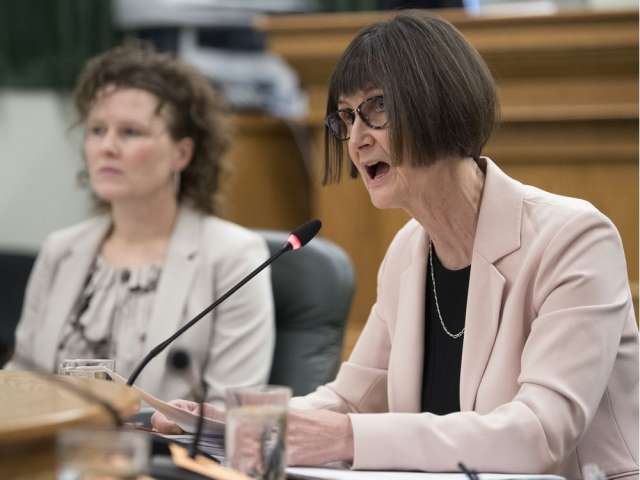
A follow-up audit looking at 2018 recommendations aimed at improving the delivery of mental health and addictions care in the region found that only half of the ten recommendations issued have been implemented.
The follow-up audit was one of several highlighted in volume one of Provincial Auditor Judy Ferguson’s report, released publicly Tuesday.
The initial audit into mental health and addictions services in Prince Albert and surrounding areas was released in volume one of the 2018 report. Since then, the auditor’s office wrote, the health authority has made improvements, but it has some more work to do.
Since that report, the health authority has implemented an integrated health record system and level of care assessment for outpatient services, put in processes to improve the proportion of clients showing up for scheduled appointments and documented discussions with addiction clients about post-detox support available to them. It has also enhanced monitoring of wait times for access to outpatient mental health and addictions services.
Still, since 2018, the authority hasn’t conducted a formal assessment of supply and demand for mental health and addictions services or developed a strategy to collect mental health and addictions client information from health care.
As the auditor looked to these recommendations, they set out to determine the service capacity of the Prince Albert region and the number of people using the service.
The audit found that the services for people accessing outpatient mental health and addictions care had not changed a lot since the 2018 audit, but that demand for the services had grown and fewer clients were receiving care within the health authority’s targeted wait times.
The authority has set a goal of at least 50 per cent of all clients receiving care by a psychiatrist within the service response targets, which ranges from 24 hours for the most severe cases to 30 days when cases are considered mild.
While the region met its goal for children with very severe or severe acuity, it didn’t for children with moderate or mild cases. In fact, in 2019-20, more than 90 per cent of the children with moderate acuity had to wait more than the targeted 20 business days to see a psychiatrist for a first appointment, which is worse than 2017-18, where about 80 per cent had to wait longer.
The data also showed that while the area met the service response target for adult clients with very severe acuity levels, it struggled to meet the target for adults referred to counselling with severe, moderate and mild acuity.
Ferguson said Tuesday that the province needs to assess the demand and availability of its mental health services in the region.
“What we really found is the service capacity … had not changed since the 2018 audit. For us this area is of concern, because they have a significant waitlist in the area for mental health services,” Ferguson said.
“You want to make sure that you are providing people with sufficient access to those services you want to make sure people are getting the right services at the right time. Mental health is one of those ones I think where timing is critical.”
The auditor’s report does note that Prince Albert lacked child psychiatrists for a period of time, referring patients instead to Saskatoon, which affected service levels. It also noted that free, walk-in counselling is provided Monday to Friday from 9 a.m. to 5 p.m. in Prince Alert.
Still, the report says, more needs to be done.
“The authority continues to struggle to provide mental health outpatient services in a timely manner,” the report said.
“Long waits can lead to people’s health condition getting worse, and in some cases, long waits can even contribute to death.”
The lack of implementation of a recommendation that the authority collect key mental health and addictions client information from health care professionals could have impacts on the efficiency of service delivery, the auditor said.
“What we’re raising concern about is the completeness of the information and the sharing of information between (public and fee-for-service) areas. If a person has access to paid services and comes back into services provided in the health care service, there isn’t a sharing of information at that time,” Ferguson said.
“You may be subjecting the same individual to different testing and slowing the delivery of services to those individuals. It’s making sure you can make that service delivery more seamless for individuals that need care.”
The auditor also found that a recommendation that the health authority work with social services to enhance housing options for mental health and addiction clients had not been implemented.
An initial meeting took place in December 2019, but since the COVID-19 pandemic hit, those discussions have been postponed to November 2021.
“The Authority and the Ministry of Social Services working together to provide stable housing can lead to better outcomes for people living with complex mental health and addictions issues,” the report said.
“In addition, providing stable housing outside of a hospital would avoid using costly hospital-based care when such care is not warranted.”
In addition to the three recommendations not implemented at all, two recommendations were only partially implemented. Those recommendations called on the health authority to document evidence of follow-up when clients do not maintain scheduled treatment and called on the authority to identify and analyze clients who frequently use mental health and addictions services to determine how they may be better served.
While the health system has improved its ability to serve, identify and follow-up with frequent users of the health system as well as those who miss appointments the audit found that measures haven’t been developed to gauge the success of initiatives aimed at addressing frequent patients of mental health and addictions services, nor had they effectively documented the follow-up process for clients who miss appointments.

